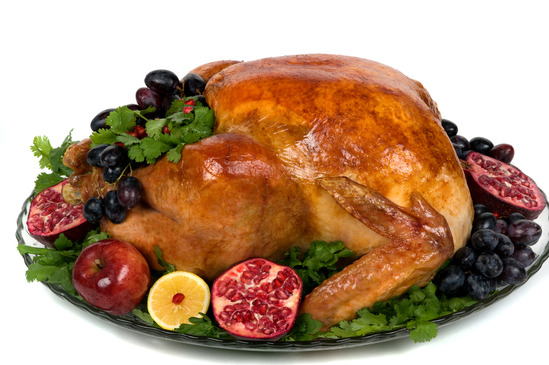The Much Expected Added Holiday Weight
|
Reading time: 6 minutes
|

Avoid the Extra Holiday Weight
It’s no wonder that we tend to eat too much during the holiday season. It may be a time of good will, togetherness, and celebration, but let’s face it: the holidays are also a time of increased stress. That stressed-out feeling all too often leads us to finding comfort in food – and holiday food is far more tempting than usual, with all of its starches, buttery sauces, and sugar.
Why do we give in so easily to holiday foods? Yes, those special candies and pies are especially tempting, but there’s more to it than that. It turns out that one key aspect of overeating – at any time of year – is based on your emotional state before and during the meal. Studies have indicated that for most people, overeating behaviors are more likely to be based on emotional cues than the specifics of the food itself. And what’s more emotional than the holidays? Whether your particular family experience is joyful or frightful, the end result may be overindulgence triggered by emotions.
The strong connection between emotional experience and eating seems to be based partly in the repetitive nature of the behavior. Think of how many thousands of times you’ve eaten a meal, snack, or treat during your lifetime. Now consider how many of those events are likely to be associated in your memory with a particular emotion, such as sadness, due to the events surrounding the experience of eating. Psychologists refer to these repeated connective experiences as conditioning. Given the special nature of some holiday foods, which are reserved only for this time of year (think fruitcake), it’s not surprising that sad memories or old feelings of anger might be deeply connected with overeating behaviors.
Given the pressures of shopping, family dynamics, and fatigue, overeating during the holidays is practically normal. But you can change those overeating traditions. To keep the holiday pounds (and those guilty feelings) away, you just need to employ a few helpful strategies.
- Be aware of your personal triggers for overeating. Perhaps you eat a little too much when you’re anxious or tired. Watch out for these times and have an alternative way to deal with those feelings instead of indulging in food. It also helps to review your healthy eating goals each day and focus on how great you’ll feel when you make good eating choices.
- It’s okay to indulge now and then with a small treat, as long as you’re making a conscious choice to do so. Practice mindful eating by chewing each bite slowly and with great relish, which can make any food taste richer and more filling. You’ll find that just two or three bites can feel like a luscious serving.
- When you attend a party or other social gathering where there will be food, plan ahead. Eat a filling, nutritious snack beforehand so that you aren’t arriving in a state of hunger. When you do eat holiday goodies at a social function, take a small piece and savor it. Try to avoid fatty items like cheese, fried appetizers, and cream-based dips – and don’t forget to limit your alcohol intake. Remember to keep your focus on the real reason for the gathering, which is to enjoy conversation with friends and loved ones.
- If it’s hard to avoid fattening goodies at work, allow yourself one small serving of a treat per day – and don’t double up on treats tomorrow if you decide to skip a treat today. Consider requesting that all holiday treats be placed in one central location in your workplace rather than being available at every desk, so that you can minimize your exposure to temptation.
The Facts about the Inevitable Added Holiday Weight

he holiday season conjures up many classic images, from mistletoe and jingle bells to evergreen trees dusted with snow. But when you think of the holidays, there’s a good chance that the very first thing that comes to your mind is the food. It’s the season for wonderfully rich foods including fattening party appetizers, peppermint candy, sugar cookies, fruitcake, and slow-cooked turkey, among other delicacies. Many of us have a love-hate relationship with the holidays thanks to all of these culinary temptations. We just know that we’re doomed to gain ten pounds by the time the calendar flips to a new year.
But do we really know that for a fact? Conventional wisdom holds that it’s almost impossible not to pack on a few extra pounds between Thanksgiving and New Year’s Day, thanks to all the rich food and multiple holiday celebrations. But when the scientific data are tallied, there seems to be a significant difference between traditional beliefs about holiday weight gain and the actual experience of the average American.
Some self-report studies (which rely on the subjects’ own perception of events) have suggested that Americans gain about 5 pounds on average during the holidays, while other media sources have inflated those numbers to between 8 and 10 pounds. More recently, a study by the National Institutes of Health sought to investigate this question based on observable data rather than self-report.
Using a representative sample of 200 individuals with a wide range of ages and body weights, the NIH researchers weighed subjects initially by October, before the holiday season began, and then weighed them again after the season had ended in February. Chances are, the study’s subjects were surprised at the researchers’ conclusions. The average weight gain in these 200 individuals turned out to be less than one pound per person. Individuals in the study who were overweight or obese at the time of the first weighing in October tended to put on more weight during the holiday season than individuals who were not already overweight.
The verdict may be that, unless you struggle with weight gain year-round, you’re unlikely to experience a significant weight increase during the holidays. Unfortunately, you may find the holidays to be a struggle if you do already have trouble regulating your weight. Incidentally, the NIH study also found that the individuals who were attempting to stay on a weight-loss diet during the holidays also ended up gaining an average of one pound.
Ultimately, as with many other things, the key to holiday eating lies in moderation. You may find that choosing to enjoy moderate portions of the foods you really enjoy will be more pleasurable than large portions of numerous foods, which can be overwhelming to the taste buds. At any rate, for most of us, the specter of holiday weight gain need not overshadow the spirit of celebration when it’s only likely to be a pound or two.
Information provided on this website is for general purposes only. It is not intended to take the place of advice from your practitioner
